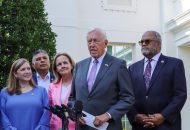Report Finds Public Option for Health Insurance Could ‘Limit Competition and Consumer Choice’

WASHINGTON – As America inches toward perhaps the most consequential election in its history — the first to be played out against the backdrop of a global viral pandemic — a heated debate continues to rage.
Since the election of President Donald Trump, he and his Republican allies in Congress have worked diligently to undermine key protections of the Affordable Care Act.
Though they tried once, and failed, to outright repeal it, there’s little doubt they will try again should Trump win re-election and they retain control of at least one chamber of Congress.
Meanwhile, the minority progressive wing of the Democratic party has been pushing for one size fits all government health care programs, such as Medicare for All, that could reduce choice and increase costs for everyone.
That proposal lacked popular support during the Democratic presidential primaries, as one after another of its proponents dropped out of the race. But it helped to revive the idea of creating a so-called national public option that would allow individuals to purchase a public, government-sponsored, insurance plan. Supporters argue that such a system could have mitigated some of the challenges the country is experiencing today.
But a new report, “The Public Option in the 2020 Economic Environment,” from FTI Consulting, suggests that while the pandemic has renewed debate over these proposals, it has also proven the resilience of the American health care system.
Yes, Americans did find the pandemic exacerbated long standing financial and access challenges associated with their health care, particularly for lower-income and minority communities.
However, the consultancy found that health care service providers crisscrossed the country to meet the needs of patients in communities overwhelmed by outbreaks, and many private insurance plans waived out-of-pocket costs to ensure continued access to medical services.
And throughout the crisis, Medicaid, COBRA and the individual insurance marketplaces have continued to function as a critical backstop for furloughed and laid-off Americans, who lost their employer-sponsored coverage.
For the sake of comparison, FTI Consulting compared the current health care system to a hypothetical U.S. health care system with a fully implemented and mature public option.
Key Findings
Among the key findings in the FTI Consulting report are that:
- Under the current system, hospitals are projected to lose $49.6 billion in revenues nationwide in 2020. Under a public option scenario, those losses would exceed $79.2 billion in total. That financial hit to providers would come on top of losses incurred solely as a result of implementation of the public option, the consultancy said.
- Under a public option, losses of commercial insurance revenues would be even greater, amounting to $20 billion for rural hospitals. For providers operating with tight margins – particularly those in rural and underserved communities – such losses could lead to the elimination of critical service lines or even facility closures.
- Any changes in service offerings or in the number of hospitals that remain operational could create access challenges for patients, especially those insured under the public option, living in rural areas or both. Many of these individuals may already have difficulty finding in-network providers or health care facilities close to home.
- Rural areas could be disproportionately impacted given that patients living there are more likely to be older, sicker and to rely on public health insurance. States deemed COVID-19 “hot spots” including California, Texas, Florida, Georgia, and Arizona will experience significant financial consequences as a result of the pandemic.
- Reductions in operating margins under a public option scenario could have serious implications for preparedness efforts. Diminished margins would limit the resources available to expand intensive care units, procure supplies and enhance staffing.

























